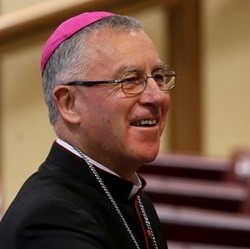The following op-ed was written by Cardinal John and originally posted on Stuff.co.nz, click here to link to the original article.
 OPINION: Young people are protesting on Friday about the slow pace of international action on climate change. We need to listen to them.
OPINION: Young people are protesting on Friday about the slow pace of international action on climate change. We need to listen to them.
Many decision-makers in the governments, businesses, community organisations and churches of the world won’t be alive to experience the impact of climate change. But today’s school students will be.
They will have to live with the consequences if we over consume the world’s resources now, and if we do not find ways to keep temperature increases in check.
The world was made by God for all to enjoy, to sustain life. That includes today’s young people and future generations. In justice, my generation should be handing on to the next generation what was given to us. We need to face the reality that we are not. Instead, we are leaving a legacy of pollution and wastefulness.
While some international politicians and business interests are still wasting time denying the reality of our changing environment, the action by young people this week is a sharp message that they understand and are acting on the latest information from the United Nations Intergovernmental Panel on climate change that the world has only 12 years left to prevent irreversible changes to our environment.
People will have different opinions about whether students should be in school on Friday. Undoubtedly we should have opened up opportunities to listen to young people without forcing them to take this action, which may have consequences for their studies.
However, in my opinion, engaging with one of the most pressing and urgent moral issues of our time is far more important than leaving school to cheer for a sports team or visiting celebrity.
But let’s not focus only on what young people are doing, but more importantly why they are doing it.

Mt Carmel School, Meadowbank. Celebrating World Water Day combined with a visit from Seven Sharp.
Despite being the group in our society who will be most affected by environmental decisions being made today, young people are telling us, as strongly and loudly as they can, that they don’t feel that they have a voice in the conversation.
That isn’t right, and it needs to change. I will be listening to what young people have to say at the students’ strike for climate change on Friday and will be inviting them to send representatives to meet with me to explain their concerns.
Whether or not you agree with the students’ action, I ask you to listen to them. We all need to listen to young people about climate change.
